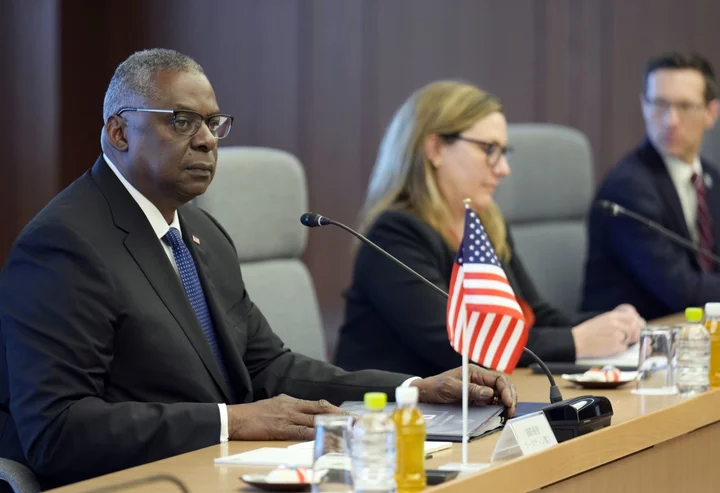US Secretary of Defense Lloyd Austin used a speech at Asia’s biggest security conference to warn that a conflict over Taiwan would be devastating and he reiterated calls for greater communication between the American and Chinese militaries.
“Make no mistake: conflict in the Taiwan Strait would be devastating,” Austin said at the Shangri-La Dialogue in Singapore on Saturday. The whole world has a stake in maintaining peace and stability in the Taiwan Strait, the whole world. The security of commercial shipping lanes and global supply chains depends on it.”
The remarks come after the US said China rebuffed requests for Austin and his counterpart, Li Shangfu, to sit down for talks at the annual defense conference. China demands that the US to remove sanctions placed on Li in 2018, a move the Biden administration considered before ruling out. The two leaders did briefly shake hands at a dinner on Friday.
“For responsible defense leaders, the time to talk is every time, and the right time to talk is now,” Austin said. “I’m deeply concerned that the PRC has been unwilling to engage more seriously on better mechanisms for crisis management between our two militaries. But I hope that will change, and soon.”
The Singapore conference is taking place with nations across Asia increasingly concerned that tensions between the US and China are irreparable and could eventually spill over into conflict. And it follows a surge in tensions between the world’s two superpowers dating back to February, when an alleged Chinese spy balloon floated through American airspace before being shot down.
Read More: Fear of US-China Conflict Looms Over Singapore Defense Forum
Li and Austin were both seated at the head table for a Friday evening dinner and speech by Australian Prime Minister Anthony Albanese. The Pentagon chief and Li were seen exchanging pleasantries at the table beforehand.
“A cordial handshake over dinner is no substitute for a substantive engagement,” he said.
Austin also used his address at the conference to contrast the US vision for the Indo-Pacific with the risks of “coercion, intimidation, or bullying” — a signal of how the US sees Beijing’s approach to regional politics.
“It’s a vision of a free, open, and secure Indo-Pacific within a world of rules and rights,” Austin said. These rules and rights, Austin said, include “human rights and human dignity” and the need to resolve “disputes through peaceful dialogue and not coercion or conquest.”
With a US-China meeting ruled out, representatives from the two sides were actively meeting with leaders from the other 40 or so nations taking part in the conference in what one delegate jokingly called “speed dating.” China’s Li met with Philippines Defense Minister Carlito Galvez on Friday, describing their talks as “very good” despite a backdrop of heightened tensions over disputed waters and Manila’s renewed military engagement with the US.
Read More: Australia’s Albanese Says US-China Conflict ‘Not Preordained’
Austin arrived after meetings with military officials in Japan, which vowed to ramp up defense spending after US-China-Taiwan tensions surged over the past year. He praised the US partnership with Singapore in talks with Defense Minister Ng Eng Hen on Friday.
Hosted by the International Institute for Strategic Studies, the Shangri-la Dialogue takes place on what is essentially neutral territory. Singapore maintains friendly ties with Beijing and Washington, and Chinese and US naval vessels routinely dock in the city-state. That said, Singapore’s military is outfitted with top-of-the-line American weaponry, including a planned purchase of F-35 jets, and its troops undertake regular exchanges and drills with US forces.
But the overarching focus the first two days has been on the widening rift between Beijing and Washington.
A joint press conference Friday with Australia’s Albanese and Singapore Deputy Prime Minister Lawrence Wong focused immediately on the refusal by China for Austin and Li to meet, and what tensions between those nations signaled for the region.
“No one wants to be in a position where we have to either contain China’s rise or limit America’s presence,” Wong said. “No one in Asean wants to see a new Cold War.”
--With assistance from Rebecca Choong Wilkins.

